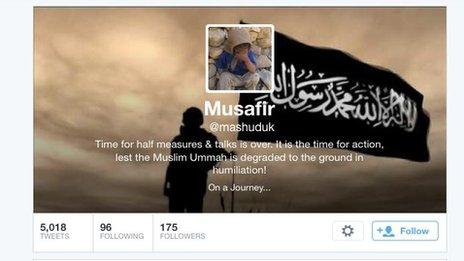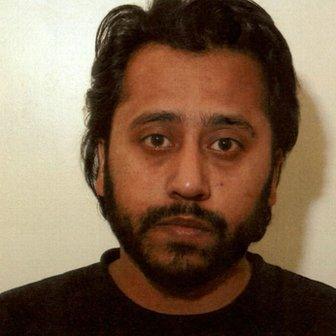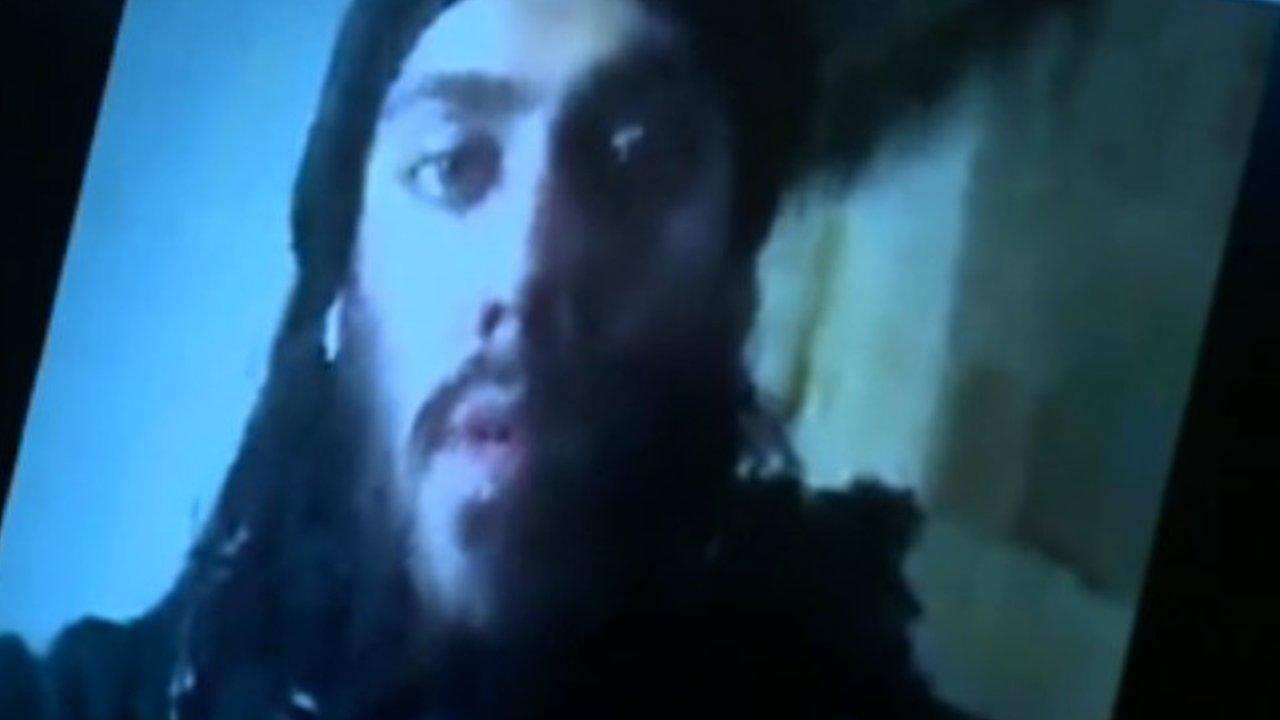Mashudur Choudhury: Serial liar and jihadist
- Published
- comments

Choudury online: Just one of his multiple identities
A Portsmouth man accused of trying to join Islamist fighters in Syria has become the first person in the UK to be convicted of a terrorist offence relating to the conflict. A jury at Kingston Crown Court found Mashudur Choudhury guilty of preparing for acts of terrorism after a two-week trial. But what exactly was Choudhury up to - and why does this conviction matter?

Mashudur Choudhury: Faces substantial sentence
If there is one thing that is true about Mashudur Choudhury, it is that he is a liar and a fantasist.
Throughout excruciating evidence in his two-week trial, the jury heard how he had:
faked a cancer diagnosis
used prostitutes abroad
invented a fake business
created multiple online personalities
But the prosecution said the accounts he had held with Twitter and other social media - written in the style of mujahideen warriors - revealed the person Choudhury really wanted to be.
The father-of-two is one of six men from Portsmouth who went to Syria in 2013. He is the only one to so far return. He claimed that he never intended to fight, but was looking for an opportunity to move his family abroad to escape what he said were failures in his home life.
Relying on a wealth of information gleaned from Twitter and other social media, prosecutors said Choudhury had broken terrorism laws because he had sought to intervene violently in the country's internal affairs for an ideological cause - the establishment of an Islamic state.
Contact on the battlefield
Choudhury's journey to Syria began in the summer of 2013, when contacted his friend Ifthekar Jaman, who had already travelled to fight.
Jaman, who had joined one of the country's jihadist groups and is now believed to be dead, gave a revealing interview to BBC Two's Newsnight programme about his experiences.
Ifthekar Jaman, who's in Syria, has been speaking to 'Newsnight' reporter Richard Watson
Choudhury gathered information about the conflict, asked his friend about military training and what to expect if he joined him.
Social media recovered by detectives, including tweets and other online conversations, show that Choudhury talked about dying a martyr's death.
He joked that they could form a special group of Portsmouth fighters in Syria - the al-Britani Brigade Bangladeshi Bad Boys.
Speaking from the witness box, Choudhury denied being a jihadist, saying he went to Syria looking for a better life.
He said he believed he had failed his wife after the collapse of a business venture and had ultimately constructed a series of increasingly elaborate fantasies and lies to make people feel sorry for him.
Those lies included pretending he had stomach cancer. That persuaded his sister-in-law to fund medical treatment in Singapore, and he invented other reasons for foreign holidays to escape his home life.
While in Singapore, the court heard, he had hung around in Starbucks and had sought out prostitutes.
Choudhury said that he was now "utterly ashamed and embarrassed" by his lies. He had considered performing "hijra" - a ritualised migration to a Muslim country - to get away from his past life, which is where Syria came into the picture.
But the prosecution said that notion of an innocent migration was just a cover story for the jury.
Journey to the frontline
In July 2013, Choudhury and other young men from the city came together in Portsmouth's Jami Mosque to secretly plan their journey to the front line.
There is no suggestion that the mosque's authorities knew of the plan - but the trial heard that some members of the Muslim community feared the men were extremists and ultimately assisted the police investigation.
The court heard that five of the men travelled:
Choudhury
Muhammad Hamidur Rahman
Assad Uzzaman
Muhammad Mehdi Hassan
Mamunur Mohammed Roshid
On 8 October, the five flew from Gatwick Airport to Turkey and then went by bus to reach the border town of Reyhanli.
They met three other Britons and the group of eight contacted Jaman for help in getting over the border.
Choudhury told the court that as he travelled deeper into Syria, he saw all the signs of a war. Burned-out cars littered the highway to the northern city of Aleppo. Their Syrian driver would tell them to duck as they passed sniper positions.
Sheltering in a rebel-controlled hospital in the bombed-out city, the men ate pasta as their table shook from artillery bombardment.
Choudhury saw corpses in body bags and a man whose hand had been chopped off as a punishment.
His account then diverged from the prosecution allegations. He told the jury that while the other Britons went to join a military training camp run by a jihadist group, he had asked the Syrians to get him out - and he ultimately flew home alone.

ISIS: One of the groups that British men have joined
After his arrest at Gatwick, Choudhury broke down in his police cell, sobbing about gun fire. Prosecutors say that he was recalling his training and that he had only returned because he had either lost his nerve or the fighters had rejected him.
Angry wife
But that wasn't the man recognised by Choudhury's wife, Toslima Akhtar. In emotional and angry evidence, she painted a picture of her husband as a useless fantasist who was incapable of joining the Syrian cause.
Until the start of the trial she had believed he had really suffered from cancer - and for an hour in the witness box she held forth about his failings as a husband, father and man. While she would be working all hours and looking after the children, he was lying in bed. When she was work, he would be texting her all day trying to get her attention.
When he texted her in 2013 suggesting they move to Syria, she completely flipped.
"I hate you," she replied. "You want to die in battlefield, go die. I really mean it, just go. I will [be] relieved at last."
In strong language, she told the court that she did not literally mean he should sacrifice himself on a foreign battlefield. She regarded his suggestion as yet another one of the "barmy" fantasies that had made her life a misery.
"I am telling him, 'Get lost,'" she explained. "'Go die, jump off a cliff. I've had enough.'"
While Mrs Akhtar believed her husband wasn't capable of fighting, his social media timelines were full of religious quotes about war, including arcane references to a belief held by some jihadi fighters that Syria marks the beginning of the end of the world.
Alison Morgan, prosecuting, said that while it was clear that Choudhury was a liar, he had also decided that a death on the battlefield offered him a way out of his miserable life.
"Going to fight and to be a martyr offered you a way out of yours sins, didn't it?" said Ms Morgan.
"No it did not," insisted Choudhury.
"You wanted to get away from your sins and your past?" she asked. "You were leading an appalling life. You had lied about your illness and you felt guilt and disgust - and you were terrified of the hereafter?"
"Yes," said Choudhury quietly.
Mashudur Choudhury will be sentenced on 13 June.
- Published2 August 2014

- Published17 December 2013
